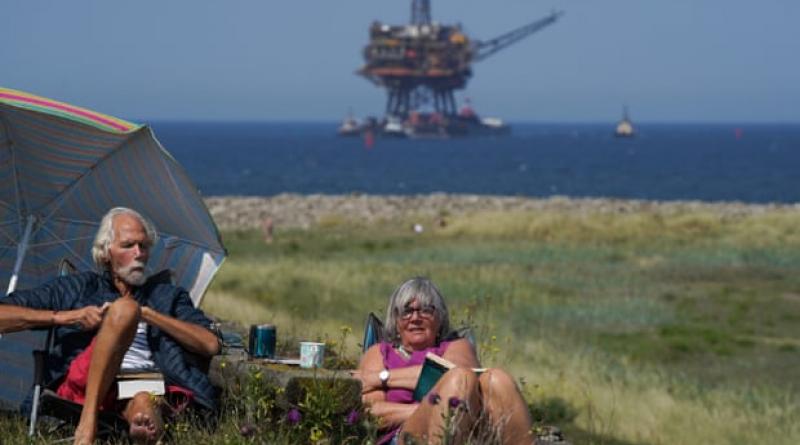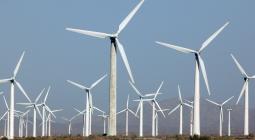On the horizon: the end of oil and the beginnings of a low-carbon planet.

With demand and share prices dropping, Europe’s fossil fuel producers recognise that peak oil is probably now behind them.
Ayear ago, only the most ardent climate optimists believed that the world’s appetite for oil might reach its peak in the next decade. Today, a growing number of voices within the fossil fuel industry believe this milestone may have already been passed. While the global gaze has been on Covid-19 as it ripped through the world’s largest economies and most vulnerable people, the virus has quietly dealt a mortal blow to oil demand too.
Energy economists claim with increasing certainty that the world may never require as much oil as it did last year. Even as economies slowly emerge from the financial fallout of the pandemic, the shift towards cleaner energy has gained pace. A sharp plunge in fossil fuel use will be followed in quick succession by a renewable energy revolution, which will occur at unprecedented pace. The tipping point for oil demand may have come and gone, and major oil companies are taking note.
Royal Dutch Shell told investors last week that the oil giant will probably never again produce as much oil as it did in the year before coronavirus hit. It is on a mission to overhaul a business steeped in more than a century of oil production and embrace clean energy alternatives. But the admission that its own oil production may have already reached its peak is less of a climate target than an acknowledgment of an inevitable and inexorable march towards a low-carbon future.
At rival BP, economists have made the case that the peak for global oil demand may have been reached last year, and that a decades-long terminal decline may have begun. The findings, made public in BP’s latest annual energy forecast, dovetail with the company’s existing corporate strategy of reducing fossil fuel production by 40% within the next 10 years.
BP has been more explicit about the road ahead than its rival Shell, but neither company can be in any doubt about the direction of travel.
The end of oil is already writ large in stock exchanges across Europe. BP’s share price has fallen to its lowest levels since 1994, and Shell is nursing a 60% decline in its market value since the start of the year as both companies face the most trying year on record for the global oil industry. Europe’s listed oil companies have reportedly lost a total of €360bn in market value in the year so far, while green energy companies have climbed steadily higher in the markets and in the esteem of equity analysts.
US oil companies have also been left bloodied and bruised by Covid-19, but have yet to publicly throw in the towel on rising oil production. It’s the same story with many of the “petronations” in the Middle East and Africa, which rely on exports from state-owned oil companies to fuel their economies.
An ideological acceptance of the death of growing oil demand is not strictly necessary, though. The oil industry has always deferred to global market forces, and the dynamics will tip in favour of declining oil production too.
The Organisation of Petroleum Exporting Countries has already deepened existing reductions in oil production by announcing the biggest cut in history earlier this year, aimed at keeping oil market prices from collapsing. The cartel, which represents almost three-quarters of the world’s oil production, is likely to keep restrictions in place into 2021 too, to ensure a “fair” price for its members’ oil. Falling demand will make this a tougher task and, as clean energy lays claim to a wider share of the global energy market, may require an indefinite reining-in of production to keep prices steady.
The beginning of the end of global oil production is a critical milestone on the road towards a sustainable planet, but the signs marking this juncture may already be in the rearview mirror.
The WTO will be watching the US election closely
In one of his last acts before this week’s election, Donald Trump threw yet another spanner in the works of the world economy. His target: the World Trade Organization. The global economy is facing two big elections in as many weeks. The first is Joe Biden’s attempt on Tuesday to make Trump the first one-term US president since George HW Bush. The second is the much less blockbuster process of picking a new WTO head, scheduled to conclude on 9 November.
Last week, Trump’s administration blocked the appointment of Ngozi Okonjo-Iweala as the next head of the global trade arbiter, despite the former finance minister of Nigeria having the overwhelming backing of the WTO’s 164 members.
It was another characteristic wrecking ball swung from the White House, which has been unhappy for some time with the Geneva-based WTO. After a lengthy selection process, Okonjo-Iweala looked set for a comfortable win. Enjoying support around the world, she would have been the first woman and the first African to lead the WTO.
Now her approval looks far from certain without the backing of the world’s biggest economy, in a development that will be unsettling at a time when trade, growth and jobs are already rocked by Covid-19.
The WTO faces a difficult choice. It either finds a compromise candidate who could secure US backing – which could even see the surprise return of Liam Fox – despite likely opposition from EU nations. Or it waits, hoping Trump loses and that a Biden presidency makes electing Okonjo-Iweala easier. Much will depend on this week’s events.
At a time when global collaboration is needed more than ever in the economic fightback from Covid, the WTO row is another reminder of the mess the world economy is in. To safeguard prosperity, more coordination and much less wrecking-ball politics is required.
Rapid testing holds out hope for airports staring into an abyss
Few businesses have prospered under coronavirus, yet a thought might still be spared for BER, Berlin’s long-awaited airport. This weekend – after a decade of delays and spiralling construction costs – it opens its doors to the crowning indignity: a world where barely anyone wants or is able to fly.
Airports are in deep trouble. Heathrow now plays second fiddle to Paris for passengers – partly, it claims, because of the UK’s quarantine regime. Its shareholders may nonetheless be privately thankful that political opposition kicked its third runway and costly expansion into the long grass.
Amid plentiful warnings from the aviation industry, the stark message last week from the Airports Council still stood out: almost 200 airports in Europe face insolvency in the coming months, more than half the total. Around 1.3 billion fewer passengers than normal have travelled since coronavirus hit in January.
The damage, the industry says, will be 277,000 jobs lost, and a ripple effect on local economies. Most endangered are regional airports, mainly in the UK, where the biggest regional airline, Flybe, fell with the first winds of the pandemic.
Calls for bespoke financial assistance for the sector have been rejected; and indeed arguments that leisure-dominated airports all constitute critical infrastructure should be taken with a pinch of salt. Neither, given studies linking fresh strains of Covid-19 with summer tourism, should aviation’s economic plight be a primary consideration.
However, the lack of harmonised rules, even within Europe, and the gaping holes in the logic and enforceability of quarantine rules are barely defensible. Government reluctance to act has fed the industry’s sense of grievance. The arguments for airport testing appear more coherent than current policy – and offer some sort of hope for the sector. The UK’s taskforce, due to report this week, must either implement rapid airport testing – or give a convincing reason why not.
1 November 2020
The Guardian




